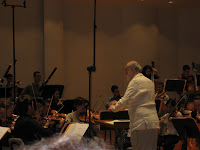



“I give you all my fire, but you don’t burn, “ says Maestro Kurt Masur in frustration as he coaxes the members of the Tel Aviv University symphony orchestra to put more intensity into a passage of Beethoven’s Third Symphony (the Eroica). For two and a half hours the almost 82 year old conductor gives his all to a group of aspiring musicians and expects the same in return, at one point urging them to “play with your whole heart to the bottom.” Although his hands shake with palsy, once the music starts he sways, hops, stoops and jabs the air for emphasis, singing along to illustrate the phrasing and dynamics he wants to hear. His right hand, with long elegant fingers extended, looks like a bird hovering and swooping as it maintains the rhythmic pulse of the music. After working very intensely on the first two movements this elderly gentleman asks the young musicians, “Are you tired?” and when they indicate they are not he continues leading them through the last two movements. It is clear he has a deep passion not only for the music but also for teaching young people. The students, as well as the audience for this master class in the small intimate music school auditorium, listen intently as he interpreted the emotional content of Beethoven’s music and translates his vision into very specific ideas about bowing, phrasing, dynamics. In one memorable instance he has a visceral reaction to the entry of the oboe, as if the note hurt his ears. He and the oboist engage in quite a lengthy back and forth, he insisting her A is too low, she explaining the problem, he suggesting she choose a shorter reed and asking the concertmistress to retune the orchestra to match her tuning. Finally, after he is satisfied and they play through a section featuring a very lovely oboe motif, he says, “you know, you really are very good!” He is no easy taskmaster. When he likes what he hears, he says, “Much better, but I have to work so hard. Don’t make an old man work so hard.” If he doesn’t like the way a particular phrase has been played, say by the string basses or the bassoons, he sings it exactly how he wants to hear it, shaking his lowered head from side to side while muttering, “I don’t give up; I must have patience”. Then, if he feels they are still not getting it, he threads his way through the stands, planting himself directly in front of the offenders and working face-to-face with them until he has achieved the desired outcome. When he is pleased with the results he touches his fingers to his lips and send them a kiss, declaring, “I love you.” When they reach the slow movement, he again refers to his age in a very direct way to illustrate the depth of the feeling they must convey. He says, “Have you ever really loved someone and then they are gone? You have no tears because you died with them. I am a bit older than you but you should know the feeling. You will all die; we all will die.” This is a very heavy message but one that is part of his personal experience as he lost a young wife and child in a car accident many years ago. I found it very powerful that he used this metaphor to elicit an emotionally charged musical response. To me it speaks to the very heart of music as a universal language. As Maestro Mazur counseled the orchestra, the audience must feel Beethoven’s music was written yesterday, not 200 years ago. As it happens I have some history with this symphony. As a young viola player, I spent hours with my music stand in the woods practicing the challenging passages for our performance of this piece at Idyllwild Music Camp. Later, I spent a semester studying Beethoven’s symphonies in a music class at Berkeley. Yet as I listen to Maestro Mazur work through the nuances of the music, it sounds fresh to my ears. The audience must feel so too, because when he finishes they give him and the student musicians a standing ovation. He asks the wind and brass sections to rise, then the strings, shaking hands all around. He seems overcome with emotion and offers this praise: “It is impressing that the students can play at such a high caliber. But I am not surprised because you have no problem here in Tel Aviv. In Israel the audience for classical music is 11% of the population while elsewhere it is 1%. This is wonderful because music makes you healthy and happy.” I am sure Maestro Masur will make many people happy this coming week when he conducts the Israel Philharmonic in a series of programs of music by Beethoven, Mendelssohn and Schnittke. In addition, he will say a few words at the Docaviv (Tel Aviv Documentary Film Festival) premier of a new documentary about his life and career. As for me, I can definitely say I feel healthier and happier for all the musical experiences I have been enjoying in Israel.
No comments:
Post a Comment